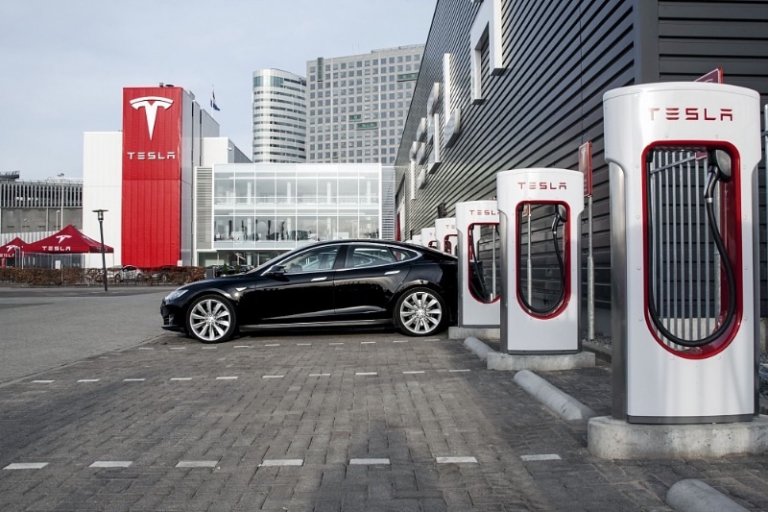Elon Musk’s Dream Of A Tesla Supercharger Carhop Is One Trademark Closer To Reality

Elon Musk pitches a lot of plans on Twitter. From his weed o’clock wink about “taking Tesla private at $420” to his recent support of joke cryptocurrency dogecoin, both the stock market and the SEC aren’t clear about what’s real and what’s meant to be comedy. But one vintage tweet is one step closer to reality.“Gonna put an old school drive-in, roller skates & rock restaurant at one of the new Tesla Supercharger locations in LA,” Musk tweeted in January 2018. Three years later, as May 2021 came to a close, Tesla filed a trademark for its brand under restaurant services with the U.S. Patent and Trademark Office in late May. And really, if you think of Tesla’s venture into the restaurant sphere as more of an ecosystem-and-community-building strategy than a full-fledged revenue stream, it makes perfect sense.
“For a company that doesn’t do any traditional marketing, it’s another way to reach the audience in a crowded electric vehicle landscape that is getting more crowded by the day,” says Dan Ives, managing director of WedBush Securities, a privately held investment firm based in Los Angeles. “It kind of follows the Harley Davidson playbook,” Ives says of Tesla’s brand recognition strategy.
Harley-Davidson licensed its brand to a Las Vegas restaurateur in what Ives describes as an attempt to target a younger demographic. This attempt to build on the back of the 118-year-old motorcycle’s image proved unsuccessful. The Harley-Davidson Cafe, which opened on the Las Vegas Strip in 1997, was shuttered in 2016 after it defaulted on rent payments. But then, the cafe didn’t have the benefit of an audience held captive while their electric vehicle charges up.
Murmurs of Tesla’s restaurant plans have circulated since 2017 when the company’s Chief Technical Officer, J.B. Straubel, broached the idea that Supercharger stations offer the perfect opportunity for restaurant service. The Silicon Valley-based company would most likely partner with restaurants to offer food, Straubel said at FSTEC, a restaurant technology conference.
As for the restaurant itself, Elon Musk has suggested an eatery reminiscent of a 50s retro diner.
“What he talked about was bringing back something like an old A&W where people were on roller skates and delivered burgers to your car while you do a supercharge,” says Ben Kallo, managing director at investment bank Baird. ”I think there’s an element of bringing back the past with the future at the same time.”The charging stations could morph into a pit stop similar to a convenience store where customers could rest up and grab a bite while their Tesla is plugged in. George Blakenship, former vice president of store design and development for Tesla, says the restaurant concept has evolved as the company toyed around with the amount of time a customer had to spend at a station to charge their electric vehicle. Over time supercharging efficiency has increased resulting in shorter stops.
“It used to be that people needed to ‘fill time’ while waiting at a Supercharger station to get enough charge, so they found things to do like go get a burger,” he wrote in an email.
Tesla also doesn’t want people to spend too much time at the charging stations to prevent them from taking up a spot when another person might need it, he says. It’s no surprise that the trademark has been filed for restaurants that offer take-out and self-service to ensure that Tesla drivers are hitting the road as soon as they are done charging their cars.
Elon Musk has two quintessential components that make him a marketing mastermind: a cult-like following and a brand that is becoming more valuable and popular by the day. In fact, the Tesla brand holds a rank of 40 out of 100 best global brands in 2021, according to Interbrand, a consultancy that bases its list on factors such as consumer sentiment and financial success. In comparison with other car brands such as Toyota and Volkswagen, the multibillion-dollar company is as valuable as the next four biggest global automobile companies combined, which have sold millions of cars more than Tesla. Tesla currently has a market value of $577 billion.
On the shoulder of its brand, the company sells a gamut of retail products from Tesla Tequila to onesies for kids. And restaurants are the latest addition for the company, which typically does not spend money on advertisements.
Instead, Tesla has sauntered into other innovative and unexplored avenues to raise awareness for its brand and for Musk, including a livestream by a Chinese social media influencer that was watched by roughly 4 million people. Another instance was when Elon Musk hosted Saturday Night Live and garnered the NBC show its third-highest rating for the season.Kimbal Musk, a Tesla board member and Elon Musk’s brother, is also the co-founder and chairman of three food companies. He owns 16 Next Door American Eatery and The Kitchen restaurants, largely based in Colorado. This personal relationship might influence the trajectory of Tesla’s restaurant concept, Kallo says.
From vegans to barbecue lovers, Tesla would have a wide customer base for its restaurants, Kallo says. “It’ll be interesting to see how they would cast the net as they go after the other type of consumer and restaurants.”
Much like Musk’s tweets, not all of Tesla’s ambitious and idiosyncratic plans meet reality. The promise of 1 million Tesla Robotaxis, a “mega rave cave” under Tesla’s Gigafactory in Berlin and a rollercoaster inside the Fremont facility are all missing in action. As for the impending restaurant concept, Tesla is slowly inching toward materializing it. Whenever the restaurant does open, it will be far from ordinary, Blakenship says.
“Think ‘food truck’ with a Cybertruck design. Think diner with a ‘Spaceballs Plaid’ interior. And don’t forget, it will likely run totally on solar,” he wrote.